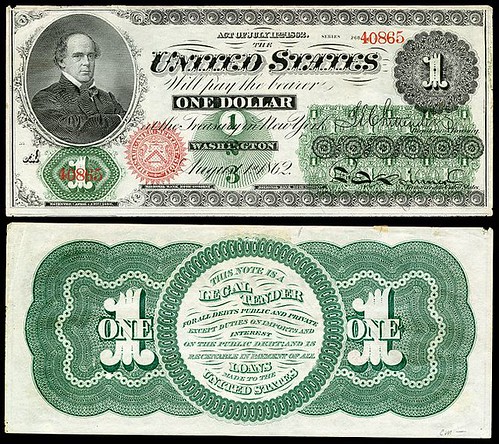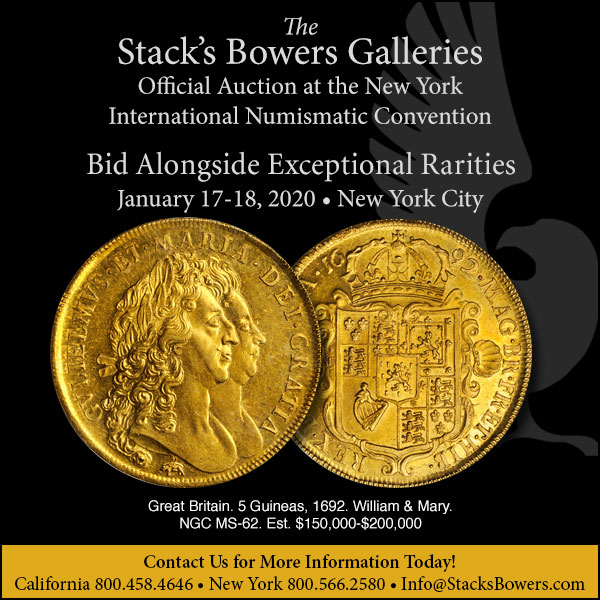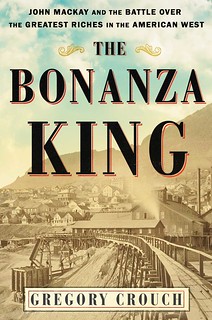
PREV ARTICLE
NEXT ARTICLE
FULL ISSUE
PREV FULL ISSUE
GOLD, SILVER AND GREENBACKSPablo Hoffman passed along this interesting DelancyPlace excerpt from The Bonanza King by Gregory Crouch. We'd mentioned the book after it was published last year. -Editor
"The previous summer, the federal government's need for money to suppress the rebellion had forced it to issue paper 'demand notes' (theoretically redeemable for specie), followed by 'legal tender notes' or 'United States Notes' a true fiat currency unbacked by precious metal. These were nicknamed 'greenbacks' on account of the green ink used to print the reverse side of the notes, but Americans in the loyal eastern states didn't fully trust Lincoln's 'shinplasters,' as went the common nickname for paper money. Steady infusions of precious metal from the Pacific Slope to eastern financial institutions did much to soothe anxiety, buttress confidence, and keep the wheels of the Northern economy turning. As the New York Herald noted that summer, 'commerce rests ... on ... confidence.' The Herald considered it 'a matter of national importance that the silver mines in Nevada Territory be fully developed.'

Image of one dollar "Greenback," first issued in 1862 "However, on the Pacific Coast, Californians and Nevadans universally reviled the federal greenbacks and tallied a black mark against the character of a person who tried to pass them off in normal business affairs. Greenbacks came into 'brisk demand' only later in the year -- people used them to pay the new federal income tax, the first ever levied from Washington, D.C. ... "[By 1864, the war was still inconclusive, highly unpopular in certain Northern circles, and] the presidential election loomed over the battlefields. The Peace Democrats -- the 'Copperheads' -- running against Lincoln advocated putting an immediate end to the fighting and negotiating for the reformation of the Union behind the slogan 'The Union as it was, the Constitution as it is.' Since the seceded states rejected anything short of Southern independence, ballot box victory of the Democrats would partition the once United States. Union forces captured Atlanta in early September and sealed Lincoln's victory. Eight days before the election, Nevada became a state. Since the start of the Civil War, several million dollars of gold and silver mined in the West had left [the gold and silver mines of Nevada and other Western states for] San Francisco each month destined for eastern ports and cities, either as bullion or coin. "A significant portion of that wealth had been raised from [Nevada's] Comstock Lode. Even though the federal greenbacks weren't backed by gold or silver, the steady infusions of western precious metals into eastern banks did much to bolster public confidence in the Northern economy and in the strength and durability of the federal government -- and those repositories of confidence were cornerstones of the Union war effort. Inflation did erode the value of the federal greenbacks as the war dragged on, but economic conditions were always much worse in the South. No metal at all backed the Confederate currency, and blockaded by the U.S. Navy, the South and its economy received no substantial gold or silver infusions throughout the entire course of the war. Southern economic confidence waned. The South had no Comstock Lode, and the increasingly powerful inflationary whirlwind that battered the rebel economy sapped the Confederacy's ability to wage war."
To read the complete article, see:
To read the earlier E-Sylum article, see:

Wayne Homren, Editor The Numismatic Bibliomania Society is a non-profit organization promoting numismatic literature. See our web site at coinbooks.org. To submit items for publication in The E-Sylum, write to the Editor at this address: whomren@gmail.com To subscribe go to: https://my.binhost.com/lists/listinfo/esylum All Rights Reserved. NBS Home Page Contact the NBS webmaster 
|
